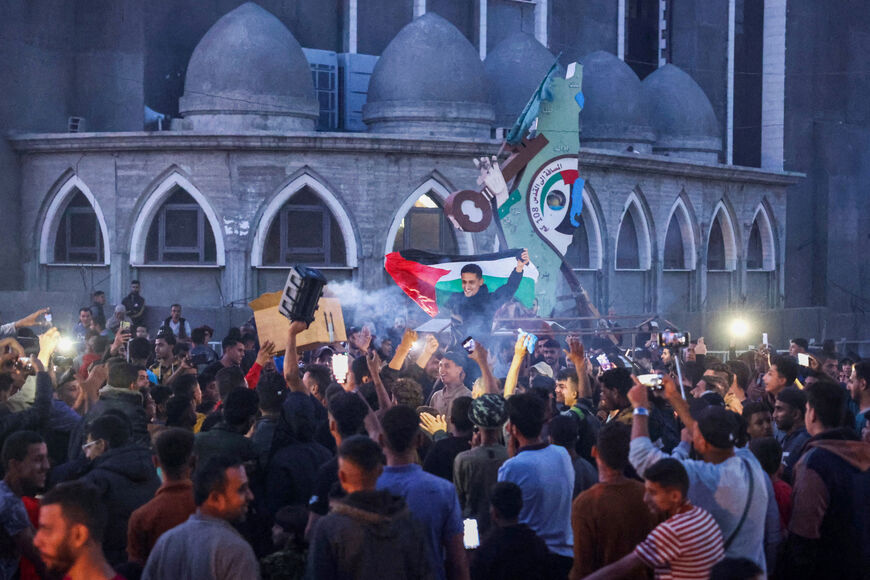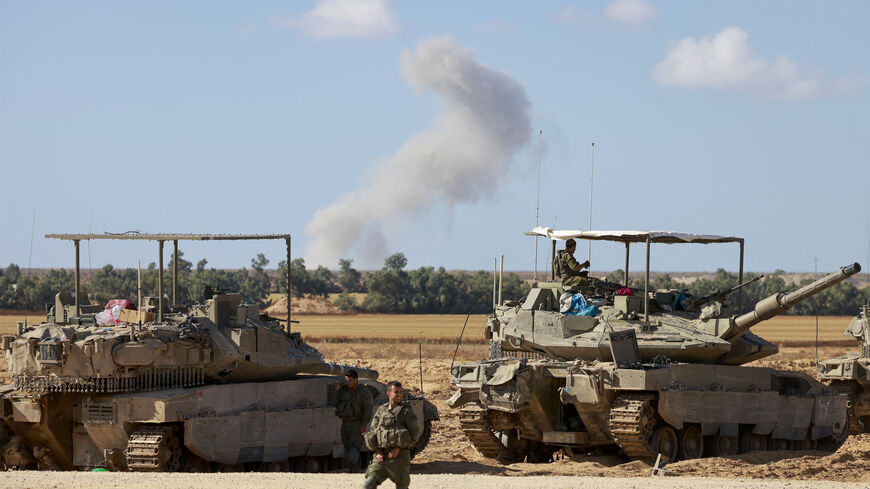The Israeli military took control of the Rafah border crossing between the Gaza Strip and Egypt less than one day after the Palestinian militant group Hamas said it accepts an Egyptian-Qatari cease-fire proposal to halt the seven-month war with Israel.
Spokesperson for the Palestinian Crossings Authority Wael Abu Omar confirmed Tuesday to the Associated Press that Israel had taken over the crossing, saying the facility is now closed.
The news comes after Hamas issued a statement late on Monday saying its leader, Ismail Haniyeh, had announced Hamas' acceptance of the Egypt-Qatar cease-fire proposal in a phone call with Qatari Prime Minister Mohammed Bin Abdulrahman Al Thani and Egyptian intelligence chief Abbas Kamel.
A Qatari delegation will head to Cairo on Tuesday to resume indirect negotiations between Israel and Hamas on the cease-fire.
Israeli delegation heads to Cairo for further negotiations
Israel has rejected reports that the Hamas-approved cease-fire proposal is similar to the proposal agreed upon by Israel, an unnamed senior Israeli official told Reuters on Tuesday.
The official added that while the new Hamas proposal is unacceptable, the war cabinet decided to send a delegation to Cairo Tuesday for further negotiations. However, the delegation would be composed of mid-level officials and not the leading negotiators.
The Hamas-approved proposal calls for the release of 33 hostages during the first phase of 42 days. But contrary to the original outline, the group won’t commit to releasing 33 hostages who are alive. The group also agreed to release three hostages every week, not every three days as Israel demanded, with the remainder freed in the last week of the first phase.
The proposal also calls for the liberation of 30 Palestinian prisoners in exchange for each hostage released in the first phase, which will include women, female soldiers, elderly and wounded. It demands the right to decide on the identity of those prisoners and does not agree to a say by Israel.
The first phase would also allow displaced people to return to the north of the Gaza Strip.
Another point of disagreement is the second phase. Israel agreed to discuss parameters for a long period of calm, but did not agree not to resume fighting, as Hamas insists.
Israeli military enters eastern Rafah
The Israeli military confirmed Tuesday morning that its troops had entered the eastern Rafah region overnight and taken control of the Rafah crossing on Gaza's border with Egypt. It said its forces had so far attacked more than 150 targets, taken control of the Gaza side of the Rafah crossing and located three tunnel shafts as 20 Palestinians were killed overnight. The military added that a vehicle carrying explosives had driven toward the troops but was destroyed before it could explode.
The official Palestinian WAFA news agency also reported on the crossing's closure, saying all movement of people and aid has stopped.
The UN refugee agency warned in a post on X that the disruption of the Rafah crossing “will halt the critical humanitarian response across the Gaza Strip.”
There were further disruptions to aid delivery late Monday night on one of Israel's main highways, where activists blocked trucks transporting humanitarian aid from entering the Gaza Strip. They demanded no assistance be delivered while the hostages are denied visits by the Red Cross. Six people were detained by Israeli police during the demonstrations.
'42-day cease-fire'
Ynet initially reported Monday, citing unnamed Israeli officials, that Hamas had not accepted the original cease-fire proposal, but rather one that was modified by the Egyptians. The newspaper quoted them as saying, "The Egyptians unilaterally flexed all the parameters so that Hamas would agree. This was done unilaterally, and this proposal is not acceptable to Israel."
But the Israeli government said later on Monday that it is studying the proposal and will send a delegation to Cairo to discuss its details.
The statement added that even though the cease-fire terms Hamas agreed to fell short of Israel's requirements, Israel will send a delegation of mediators "to fully exhaust the possibility of reaching an agreement under terms acceptable to Israel."
Senior Hamas official Khalil al-Haya told Al Jazeera that the modified proposal included a 42-day cease-fire in a first stage, which would include the release of women and female soldiers as well as elderly and sick hostages. For each civilian released, Israel will release an unspecified number of Palestinian prisoners who are minors, women and elderly. The deal would see three hostages released each week. The original proposal agreed to by Israel stated that three hostages would be released every three days in the first phase.

Israel's war cabinet conducted a phone consultation late Monday night to discuss the latest developments, the Israeli press reported. After the meeting, Prime Minister Benjamin Netanyahu's office said in a statement, "The war cabinet decided unanimously that Israel will continue with its action in Rafah to pressure Hamas militarily in order to advance the release of our hostages and the other goals of the war."
US negotiator in Middle East
The news comes as the Biden administration is making a last-ditch effort to avoid a Rafah invasion. CIA Director Bill Burns remains in the region for cease-fire negotiations, conducting shuttle diplomacy between Egypt, Qatar and Israel.
State Department spokesperson Matthew Miller told reporters Monday that the United States was reviewing Hamas’ response and would discuss it with Egypt, Qatar and Israel over the coming hours.
Miller declined to characterize the nature of Hamas' response, but he said Burns was “in the region working on this in real time.”
National Security Council spokesperson John Kirby told reporters Monday, “We are at a critical stage right now. We got a response from Hamas. Director Burns is working through that, trying to assess it, working with the Israelis. I don’t know if it gets any more sensitive than right now."
Asked about evacuation of some Palestinians from Rafah today in preparation for an expected operation there, Kirby said, “We don’t want to see operations in and around Rafah that make it harder for the people seeking refuge there and shelter to be safe and secure.”
Palestinians jubilant
Footage circulating on social media showed Palestinians in Rafah rejoicing in the streets after Hamas’ announcement on Monday. Meanwhile, hundreds of demonstrators gathered Monday evening near the Defense Ministry in Tel Aviv, calling for the government to accept a truce deal with Hamas. Several demonstrators were seen lying on the roads to block traffic, refusing police instructions to evacuate the intersection.
Turkish President Recep Tayyip Erdogan welcomed the announcement. “We were pleased to hear Hamas' announcement that it accepted the cease-fire in line with our advice. Now, the same step should be taken on the Israeli side. I call on all Western actors to put pressure on the Israeli administration.”
Erdogan wrote in a post on X that he had discussed the deal with Haniyeh on the phone on Monday. Beirut-based Al-Mayadeen reported that Haniyeh also spoke on the phone with Iranian Foreign Minister Hossein Amir-Abdollahian while Reuters reported that the Hamas leader also spoke to the emir of Qatar, Sheikh Tamim bin Hamad Al Thani.
The Egyptian and Qatari governments did not immediately respond to Hamas' statement. Earlier on Monday, the Egyptian Foreign Ministry said in a statement that it "warns against the dangers" of an Israeli operation in Rafah.
Saudi Arabia decries 'genocide' in Gaza
The Saudi Foreign Ministry issued a warning on Monday against a potential Rafah operation, slamming what it described as Israel’s “genocide” in Gaza.
“The ministry renewed the kingdom’s demand for the international community to intervene immediately to stop the genocide carried out by the occupation forces against defenseless civilians in the occupied Palestinian territories,” the ministry said in a statement.
Israel steps up Rafah plans
But even as momentum builds in the cease-fire talks, the Israeli military said at 10:18 p.m. local time that it conducted strikes against Hamas targets in eastern Rafah.
The Hamas-affiliated Safa news agency reported an Israeli air raid in central Khan Younis at 9:38 p.m. local time. The city is located north of Rafah.
It also reported Israeli air raids in the al-Tanur and al-Janina neighborhoods east of Rafah, as well as Israeli artillery fire in the area.
President Joe Biden spoke to Israeli Prime Minister Benjamin Netanyahu on the phone Monday and reiterated the United States' opposition to an Israeli offensive in Rafah, where 1.4 million Palestinians are sheltering.
Earlier Monday, the Israeli military ordered the evacuation of 100,000 Palestinians in eastern Rafah ahead of a potential offensive in the southern Gazan city.
On April 27, Hamas received an Egyptian-mediated outline for a new deal for a cease-fire in Gaza and the release of hostages, based on proposals made by Israel. The three-phase proposal includes the release of 33 hostages in exchange for the release of hundreds of Palestinian prisoners incarcerated in Israel, the return of displaced Gazans to the north of the Strip and the withdrawal of the Israeli military from urban areas in Gaza along with discussions on a long period of calm.
Over the weekend, Hamas fired some 14 rockets from Rafah toward the Israeli Kerem Shalom crossing, killing four Israeli soldiers in what Israel considered a signal from the group that it is not interested in the deal.
This developing story has been updated since initial publication.




